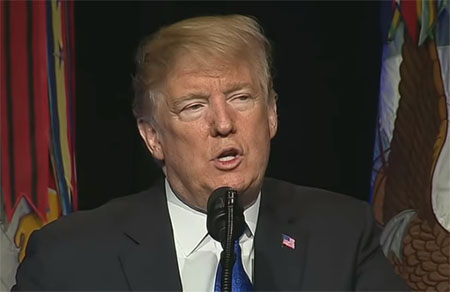by WorldTribune Staff, May 9, 2019
U.S. President Donald Trump on May 8 announced sanctions on Iran’s trade in metals, which is the Islamic Republic’s third largest export.
Trump’s executive order imposes sanctions on Iran’s iron, steel, aluminum, and copper sectors.

Trump said the new sanctions target “Iran’s revenue from the export of industrial metals — 10 percent of its export economy — and puts other nations on notice that allowing Iranian steel and other metals into your ports will no longer be tolerated.”
Related: Gulf deployment ordered after intel revealed ‘credible’ Iran threat to U.S. forces in region, May 7, 2019
The U.S. president has already moved to restrict Iran’s oil exports, the country’s largest source of hard currency.
“Teheran can expect further actions unless it fundamentally alters its conduct,” Trump said, adding that he was open to talks. “I look forward to some day meeting with the leaders of Iran in order to work out an agreement and, very importantly, taking steps to give Iran the future it deserves.”
U.S. Secretary of State Mike Pompeo said on May 8 that “We will deny the regime the resources it uses to fund terror.”
“Today marks one year since President Trump made the historic decision to leave the Iran nuclear deal and embark on a bold new strategy to counter Iran. Our maximum pressure campaign has already achieved historic success,” Pompeo tweeted.
Pompeo also responded to Iran’s decision to reduce some of its commitments under the 2015 nuclear deal with world powers.
“The Iranian regime’s announcement that it intends to expand its nuclear program defies international norms and is a blatant attempt to hold the world hostage,” Pompeo said. “We call on the international community to hold Iran’s regime accountable for its threat to expand its nuclear program.”
Hours prior to Pompeo’s comments, Iran threatened to enrich its uranium stockpile closer to weapons-grade levels in 60 days if world powers fail to negotiate new terms.
The Western European parties in the nuclear deal, Britain, France, and Germany, criticized Iran’s “unwelcome” step and warned Teheran not to abandon the deal.
Russia, another signatory to the agreement, said Washington was to blame for Iran’s decision.
Israeli Prime Minister Benjamin Netanyahu, meanwhile, stressed that Israel will prevent Iran from acquiring nuclear weapons.
“We will not allow Iran to achieve nuclear weaponry. We will continue to fight those who would kill us,” Netanyahu said at the Memorial Day ceremony at the central military cemetery on Mount Herzl in Jerusalem.
Your Intel Brief: Geostrategy-Direct __________ Fix The Media Now
